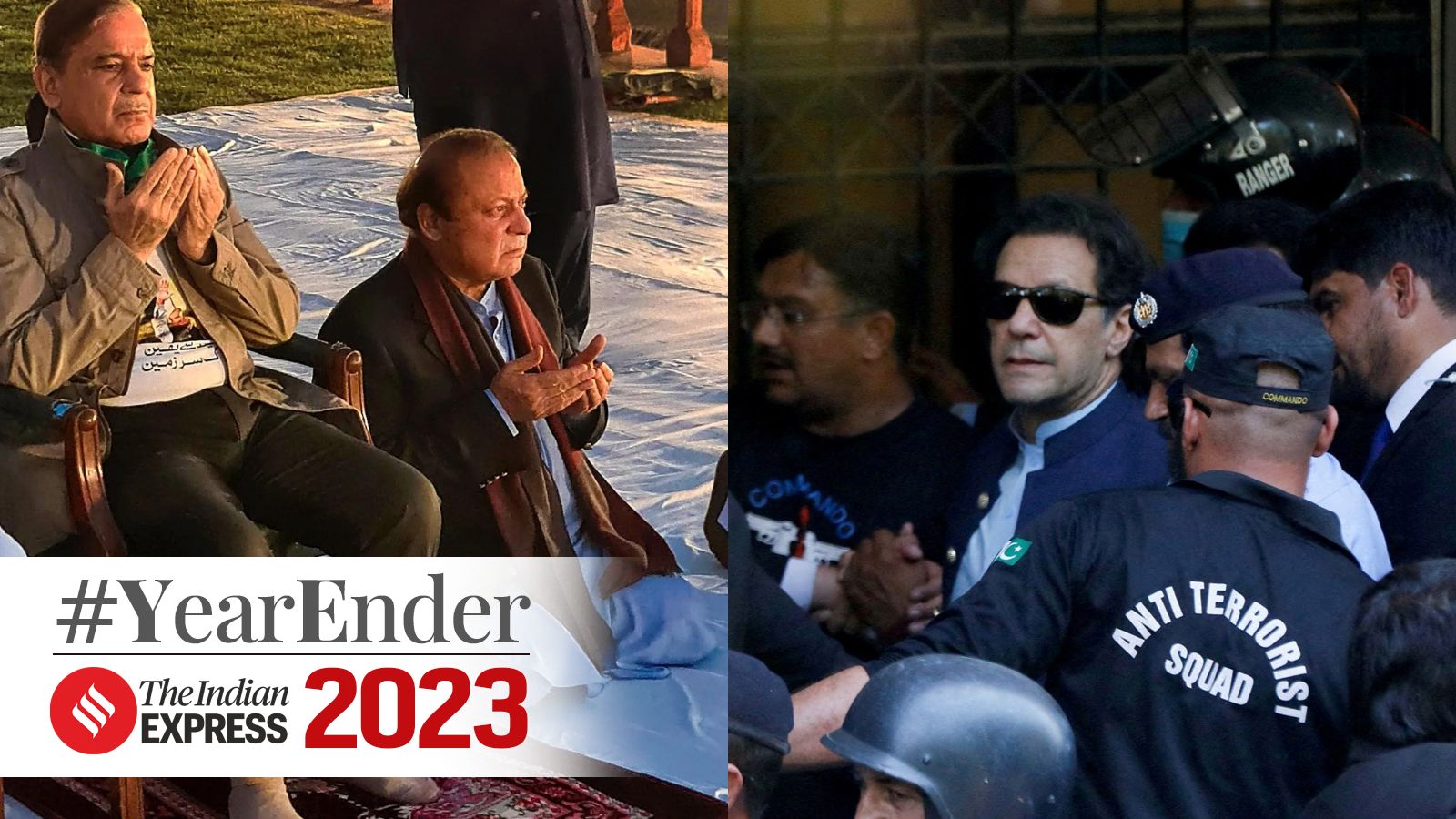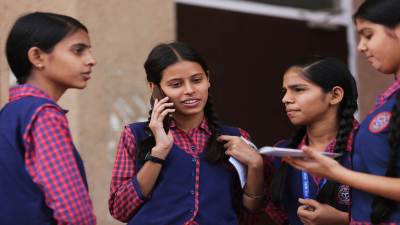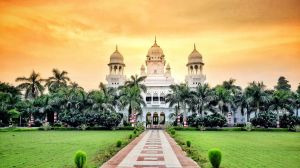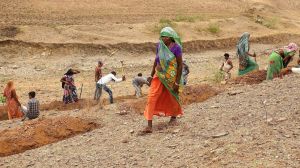Political exits and comebacks, economic and security crises: What Pakistan witnessed through 2023
As the year comes to a close, Pakistan gears up for the February 8 polls, where Nawaz Sharif will look at wresting back his support base from former PM Imran Khan, who has been disqualified from contesting the elections owing to conviction on charges of corruption.
 Pakistan's former prime minister Nawaz Sharif with his younger brother Shehbaz Sharif offers prayer, in Lahore, after hisreturn to Pakistan; security officers escort Pakistan's former Prime Minister Imran Khan as he appears in Islamabad High Court. (PTI, Reuters)
Pakistan's former prime minister Nawaz Sharif with his younger brother Shehbaz Sharif offers prayer, in Lahore, after hisreturn to Pakistan; security officers escort Pakistan's former Prime Minister Imran Khan as he appears in Islamabad High Court. (PTI, Reuters)Economy in doldrums despite sizeable aid
Cash-strapped Pakistan saw a year of defaults and aids as unchecked inflation continued to trouble the masses, prompting widespread immigration out of the country.
The year’s beginning saw dwindling foreign reserves, as inflation caused the state bank to raise its monetary policy rate to 17 percent, Pakistan’s highest key policy rate since 1997. Year-on-year inflation in January was recorded at 27.55 percent, the highest since May 1975, with thousands of containers of imports held up at Karachi port. Another dim historic in February when Pakistan rupee underwent its biggest ever devaluation of 15 percent. As knocking the IMF’s doors came of no avail, China entered, becoming the country’s biggest creditor by loaning it $700 million loan. As the inflation peaked to a 50-year-high of 30 percent in March, China came to the rescue again, this time with a $2 billion loan.
Inflation further soared to 36.4 percent in April, and this month came Saudi Arabia’s pledge to Pakistan of $2 billion. This assumed important at a time a $1.1 billion IMF tranche remained unlocked so far, owing to the lack of financing assurances from bilateral creditors. As talks with the IMF dragged on, the government increased taxes, slashed subsidies and stopped artificial control of the rupee in June, Dawn reported. In came China, with a roll over of $1 billion, at a time foreign exchange reserves held by the central bank fell below $3 billion, not enough to pay for a month’s worth of imports.
As the rupee continued its depreciation against the dollar by 1.34 percent in July, China’s latest $600 million aid brought Beijing’s loans to Pakistan to $5 billion in three months. Under the $3 billion standby arrangement (SBA), Pakistan received $1.2 billion from the IMF as the first tranche in July. Inflation hovered at 27.4 percent in August and the rupee depreciated around 6.2 percent. Months of talks finally yielded results, with $700 million as the second tranche being unlocked, final approval for which is expected when the executive board meets on January 11.
In 2023, according to the World Bank, over 39.4 per cent of the population fell below the poverty line, which means over 12.5 million people are living in meagre conditions, Dawn reported. Additionally, 8.5 million people face acute food insecurity.
The economic crisis has led to nearly 200,000 people leaving in the first three months of the year itself, according to Deutsche Welle. Hundreds of Pakistanis had died when an overloaded trawler full of immigrants capsized off southern Greece in June.
Pakistan’s current economic model is not working since it has fallen behind its peers, significant progress in poverty reduction has now started to reverse, and the benefits of growth have accrued to a narrow elite, the World Bank Country Director Najy Benhassine was quoted as saying by Dawn.
As crucial elections near, clouds surround Imran Khan’s political fate
Campaigns gained momentum as the year came to a close, as Pakistan looks to vote in general elections on February 8. As back-from-exile Nawaz Sharif looks to become the prime minister for a record fourth time, the absence of his main challenger Imran Khan further cements his chances of a win.
73-year-old Sharif has been acquitted in all corruption cases and enjoys the protocols of a prime minister-designate. He said that repairing diplomatic ties with neighbouring nations, including India, Afghanistan, and Iran, was on the agenda of his Pakistan Muslim League-Nawaz (PML-N) party. “How can you achieve global status when your neighbours are upset with you?” he asked.
Addressing a press conference in Karachi, Sharif expressed his resolve to take “everybody on board” in a bid to uplift the country. “It is fundamental to put out all-out efforts for the sake of the country’s prosperity,” he said. Shehbaz Sharif has welcomed the newcomers to the party, but has also been taking steps to forge an anti-PPP electoral alliance in its stronghold Sindh. The Dawn reported that Sharif secured a deal with the six-party coalition Grand Democratic Alliance (GDA).
Meanwhile, Pakistan’s election body rejected Khan’s nomination to contest the elections in two constituencies because he was not a registered voter of the constituency and because he is “convicted by the court of law and has been disqualified”.
The jailed cricketer-turned-politician Imran Khan alleged his party members were targeted, arrested and stopped from filing nomination papers for the elections despite assurances from the top poll body and the judiciary. The election commission recently rejected nomination papers submitted by Shah Mehmood Qureshi, vice chairman of Khan’s party, the Pakistan Tehreek-e-Insaaf (PTI).
Dr Saveera Parkash, a Hindu in Khyber Pakhtunkhwa’s Buner district in Pakistan, became the first woman from the community to file her nomination papers for a general seat.
 Dr. Saveera Parkash, the first woman from the minority Hindu community to run in the provincial elections in Pakistan’s Khyber Pakhtunkhwa province. (PTI)
Dr. Saveera Parkash, the first woman from the minority Hindu community to run in the provincial elections in Pakistan’s Khyber Pakhtunkhwa province. (PTI)
A new political front organisation of the 26/11 Mumbai terror attacks mastermind Hafiz Saeed fielded candidates for most of the national and provincial assembly constituencies across Pakistan, saying it wants to make the country an Islamic welfare state. Saeed, the founder of Lashkar-e-Taiba (LeT), has been in jail since 2019 after being convicted for several years in multiple terror finance cases along with some other leaders of the banned Jamaat-ud-Dawa (JuD).
Imran Khan’s arrest, PTI cornered
Days of speculation over Imran Khan’s arrest, the clashes between the army and the former cricketer’s supporters, finally ended with the Pakistan Tehreek-e-Insaaf chief’s dramatic arrest in May as he faced charges of corruption, unlawfully selling gifts received from foreign dignitaries, and leaking state secrets.
Though he got bail in the Toshakhana case, pertaining to gifts received from foreign dignitaries, he remains in custody after he was indicted for allegedly leaking state secrets.
Khan delivered a speech using an audio clip generated through artificial intelligence (AI) to address a virtual rally – the first event of its kind in the South Asian country. A clip, which was laid over a video containing his AI-generated image as well as photos from previous Pakistan Tehreek-e-Insaaf (PTI) rallies and earlier speeches by him, drew more than five million views on social media platforms including YouTube, Facebook and Twitter. Several users reported outages in the live streaming of the speech.
ℹ️ ICYMI: Metrics show major social media platforms were restricted in #Pakistan for ~7 hours on Sunday evening during an online political gathering; the incident is consistent with previous instances of internet censorship targeting opposition leader Imran Khan and his party PTI https://t.co/AS9SdfwqoH pic.twitter.com/XXMYBhknXd
— NetBlocks (@netblocks) December 18, 2023
Nawaz Sharif is back!
Three-time former Pakistan Prime Minister Nawaz Sharif returned to Pakistan after a four-year-long self-imposed exile. He was disqualified from holding public office by the Supreme Court in the Panama Papers case in 2017. In December 2018, another court convicted Sharif in a corruption case and sentenced him to seven years in prison and fined $25 million. In November 2019, Sharif was allowed to leave jail on health grounds and he flew to London, only to return around four years later.
His brother and PML-N president Shehbaz Sharif’s government amended the Elections Act, limiting the disqualification of lawmakers to five years. The case is expected to be decided by the Supreme Court before elections scheduled to be held on February 8.
Pakistan deports Afghan refugees
Thousands of Afghan refugees were forcibly deported from Pakistan to Afghanistan, as Pakistan’s interim government initiated the deportation of over 1.7 million undocumented immigrants from its neighbouring country from November 1. Deputy Prime Minister of Afghanistan, Abdul Salam Hanafi, highlighted the staggering figure of 8,00,000 Afghan refugees deported by Pakistan and Iran.
Many of these Afghan refugees were awaiting resettlement in the United States, Dawn reported. Pakistan began expelling undocumented foreigners, mostly Afghans, on November 1, amid accusations that Afghanistan harbours the banned Tehreek-i-Taliban Pakistan and other militants.
A year of deadly attacks
At least 23 soldiers were killed and dozens injured after militants attacked a police compound in the Khyber Pakhtunkhwa province. 59 lives were lost in an attack in September in Mastung in the southern province of Balochistan during a gathering for a procession to mark the birthday of the Prophet Mohammad
Jamiat Ulema Islam-Fazl (JUI-F) party’s rally saw a suicide bombing that claimed 63 lives, while 17, mostly policemen, were killed in two explosions in a counter-terrorism ammunition depot in the northwestern Swat valley. In January, a suicide bomber blew himself up inside a crowded mosque in a highly fortified security compound in the north-western city Peshawar, killing at least 100 people, mostly policemen.
Minorities see tough year
Police arrested 129 Muslims after a mob angered by an alleged Quran desecration attacked a dozen churches and nearly two dozen homes of minority Christians, officials said Thursday. Police also arrested two Christian men accused of defacing Islam’s holy book.
The alleged desecration set off a violent rampage Wednesday in Jaranwala, causing Christians to flee to safer places in the eastern city as the mob inflicted one of the country’s most destructive attacks on Christians.
A Hindu temple was attacked with rocket launchers by a gang of dacoits in the Southern Sindh province, in the second such incident of vandalism of a place of worship belonging to the minority community in less than two days. The assailants attacked the small temple built by the local Hindu community and adjoining homes belonging to members of the minority community in the Kashmore area of the Sindh province.
The attack came after the Mari Mata Temple in Karachi’s Soldier Bazar was razed to the ground by bulldozers in the presence of a heavy contingent of police force late on Friday night, after being declared an old and dangerous structure.
Tourism push makes country ‘best performing destination’
Pakistan was the ‘best performing destination’ in terms of tourism during the first nine months of 2023, according to the ‘World Tourism Barometer’ published by the World Tourism Organisation of the United Nations, Dawn reported.. Pakistan made a remarkable 92 per cent recovery to pre-pandemic levels in 2023, as the country experienced a 115 per cent surge in foreign tourist arrivals compared to the previous year. This was attributed to Pakistan’s concerted efforts to promote itself as a destination for tourism on the world stage.
Severely polluted air chokes Pakistan, Lahore worst-affected
Thousands fell sick in east Pakistan, as toxic smog forced closure of schools, offices, malls and parks in three cities. The worst-affected city was Lahore, where the AQI hovered around the 400 mark in November
While Air Quality Life Index finds that air pollution shortens the average life expectancy by 3.9 years, the number in Lahore stands at seven years. Lahore also consistently remains among the world’s cities with the worst air.
Artificial rain has been used in an attempt to lower pollution levels in Lahore, Pakistan. To ease the air quality crisis in Lahore, the Punjab provincial government attempted creating rain by cloud seeding, but scanty rainfall was received as the cloud quality was not very good, The Guardian reported.
Fair Finance Pakistan, an organization working to address the impact of climate change, has estimated that air pollution leads to at least 128,000 deaths in Pakistan every year, while the real number is likely higher, according to Human Rights Watch.
On the world stage
Pakistan defeated India in an election at the Unesco executive board for the post of vice chair, in which Islamabad’s candidate got 38 votes while India’s received 18. Pakistan’s victory of being elected as vice chair of the UNESCO Executive Board for 2023-2025 from the Asia Pacific Group, was seen as a major setback for Indian diplomats in the UN.
Meanwhile, Pakistan confirmed that it has applied for membership in the BRICS grouping, a five-nation bloc comprising Brazil, Russia, India, China and South Africa formed as a grouping of emerging economies from an investors’ interest perspective.
At the sea front, the navies of China and Pakistan conducted a week-long joint exercise Sea Guardians at a naval base in Karachi, which included anti-submarine operations and joint maritime patrols.
Hunger, domestic violence, child sexual abuse see rise
Violence against women and girls has risen significantly owing to loss of livelihoods and restrictions, an Asian Development Bank (ADB) report found, as per Dawn. Titled Gendered Impacts of the Covid-19 Pandemic in Central and West Asia, the study mentioned that a survey in Punjab and Sindh found an increase in incidence of threats of physical violence (40 per cent) and physical assault from spouses (46pc).
14 percent of surveyed women knew someone in their community who was threatened with physical harm by their husband, 19 percent knew someone who was physically assaulted by her husband, and 27 percent knew cases where children were beaten by their parents.
Further every two hours, a child was subjected to sexual abuse, Islamabad-based NGO Sahil’s report was quoted as saying by Al Jazeera. The report mentioned 2,227 cases of child sex abuse between January and June itself.
Hunger plagued the world’s fifth most populous country, which was ranked 99th out of 129 nations on the Global Hunger Index and will fail to achieve “low hunger” by 2030.
- 01
- 02
- 03
- 04
- 05































